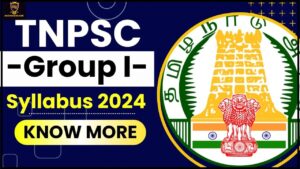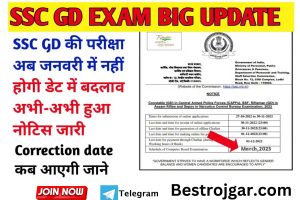TNPSC Group I Syllabus 2024: तमिलनाडु लोक सेवा आयोग 13 जुलाई 2024 को संयुक्त सिविल सेवा परीक्षा (Group I Service) आयोजित करेगा। इसके लिए संगठन ने अपने आधिकारिक वेब पोर्टल पर ऑनलाइन आवेदन प्रक्रिया शुरू कर दी है। इसलिए, जो लोग आगामी समूह I सेवा भर्ती परीक्षा के लिए उपस्थित होने जा रहे हैं, वे यहां परीक्षा पैटर्न और TNPSC Group I Syllabus here कर सकते हैं।
आप प्रीलिम्स और TNPSC Group I Syllabus PDF for both Prelims and Mains डाउनलोड करने के लिए नीचे दिए गए सीधे लिंक पर भी क्लिक कर सकते हैं।

TNPSC Group I Syllabus 2024: Overview
| Recruitment Board | Tamil Nadu Public Service Commission |
| Exam Name | Combined Civil Services Examination |
| Post Name | |
| Article Type | TNPSC Group I Syllabus 2024 |
| Total Post | 90 |
| Selection Process |
|
| Application Process | 28 March to 27 April 2024 |
| Prelims Exam Date | 13th July 2024 09.30 A.M. to 12.30 P.M. |
| Official Website | tnpsc.gov.in |
Selection Procedure
On what basis will the persons eligible for the Combined Civil Services Examination (Group I Service) be selected?
- Preliminary Examination (Objective Type)
- On-Screen Certificate Verification
- Main Examination (Written Test & Personal Interview)
TNPSC Group I Exam Pattern
Check the TNPSC Group I Exam Pattern for both Prelims and Main Exam here –
TNPSC Group I Prelims Exam Pattern
- Duration: 3 Hours
- Qualifying Marks (for others): 120
- Qualifying Marks (SCs, SC(A)s, STs, MBCs/DCs, BC(OBCM)s and BCMs): 90
TNPSC Group I Preliminary Exam Pattern
| Subject | Question | Marks |
| General Studies (Degree Standard) | 175 | 250 |
| Aptitude & Mental Ability Test (SSLC Standard) | 2500 | 50 |
| Total | 200 | 300 |
TNPSC Group I Mains Exam Pattern
- Paper 1 Qualifying Marks (for all categories): 40 out of 100
- Paper 2, 3, and 4 Qualifying Marks (Out of 750):
- 255 (for SCs, SC(A)s, STs, MBCs/DCs, BC(OBCM)s and
- BCMs) and 340 for Others
TNPSC Group I Mains Exam Pattern
| Papers | Subjects | Marks | Duration |
| I | Tamil Eligibility Test (SSLC Standard) | 100 | 03 Hours |
| II | General Studies – 1 (Degree Level) | 250 | 03 Hours |
| III | General Studies – 2 (Degree Level) | 250 | 03 Hours |
| IV | General Studies – 3 (Degree Level) | 250 | 03 Hours |
| Total | 850 | ||
| Personal Interview | 100 | ||
TNPSC Group I Syllabus 2024

Candidates can check the TNPSC Group I Syllabus for both Prelims and Main exams here. You can check the topics asked in the exam here.
TNPSC Group I Prelims Syllabus
| UNITS | Topics of TNPSC Group I Syllabus |
| UNIT-I: GENERAL SCIENCE |
|
| UNIT-II: CURRENT EVENTS |
|
| UNIT-III: GEOGRAPHY OF INDIA |
|
| UNIT–IV: HISTORY AND CULTURE OF INDIA |
|
| UNIT-V: INDIAN POLITY |
|
| UNIT-VI: INDIAN ECONOMY |
|
| UNIT-VII: INDIAN NATIONAL MOVEMENT |
|
| UNIT-VIII: History, Culture, Heritage, and Socio – Political Movements in Tamil Nadu |
|
| UNIT–IX: Development Administration in Tamil Nadu |
|
| UNIT-X: APTITUDE AND MENTAL ABILITY |
|
TNPSC Group I Mains Syllabus
| Sections | Topics of TNPSC Group I Syllabus |
| TNPSC Group I Syllabus for Paper I | Tamil Eligibility Test (SSLC Standard) |
| TNPSC Group I Syllabus for Paper II | UNIT- I: Modern history of India and Indian cultureUNIT- II: Social issues in India and Tamil Nadu UNIT- III: Ethics and Integrity |
| TNPSC Group I Syllabus for Paper III | UNIT- I: Indian Polity and emerging political trends across the world affecting IndiaUNIT- II: Role and impact of Science and Technology in the development of India UNIT- III: Tamil Society
|
| TNPSC Group I Syllabus for Paper IV | UNIT- I: General Geography and Geography of India with special reference to Tamil NaduUNIT- II: Environment, Bio-Diversity, and Disaster Management UNIT- III: Indian Economy
|
Important Link:-
| TNPSC Group I Syllabus PDF for Prelims | Check PDF Here |
| TNPSC Group I Syllabus PDF for Mains | Check PDF Here |
| TNPSC Group I Notification PDF | Click Here |
| Official Website | Click Here |
| Home Page | Click Here |
| Join Telegram | Click Here |
निष्कर्ष –TNPSC Group I Syllabus 2024
इस तरह से आप अपना TNPSC Group I Syllabus 2024 से संबंधित और भी कोई जानकारी चाहिए तो हमें कमेंट करके पूछ सकते हैं |
दोस्तों यह थी आज की TNPSC Group I Syllabus 2024 के बारें में सम्पूर्ण जानकारी इस पोस्ट में आपको इसकी सम्पूर्ण जानकारी बताने कोशिश की गयी है
ताकि आपके TNPSC Group I Syllabus 2024 से जुडी जितने भी सारे सवालो है, उन सारे सवालो का जवाब इस आर्टिकल में मिल सके|
तो दोस्तों कैसी लगी आज की यह जानकारी, आप हमें Comment box में बताना ना भूले, और यदि इस आर्टिकल से जुडी आपके पास कोई सवाल या किसी प्रकार का सुझाव हो तो हमें जरुर बताएं |
और इस पोस्ट से मिलने वाली जानकारी अपने दोस्तों के साथ भी Social Media Sites जैसे- Facebook, twitter पर ज़रुर शेयर करें |
ताकि उन लोगो तक भी यह जानकारी पहुच सके जिन्हें TNPSC Group I Syllabus 2024 की जानकारी का लाभ उन्हें भी मिल सके|
Source:- Internet


